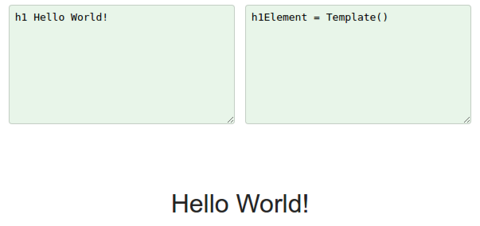Pure and simple clientside templates
Jadelet is the cleanest and simplest way to describe your templates. It is a breeze to learn. Jadelet attributes correspond directly with HTML attributes. If you know HTML then you already know Jadelet.
Other libraries and frameworks put up barriers between you and the DOM. Like a dutiful servant, Jadelet brings the power of the DOM into your hands.
Jadelet is the smallest of all clientside templating libraries (< 2.5kb). But don't let its size fool you: it contains tremendous power.
Jadelet is free, MIT licensed, open source, non-GMO, and production ready.
h1= @titleHeaderTemplate = require "./header"
headerElement = HeaderTemplate
title: "Hello world"button(click=@sayHey)ButtonTemplate = require "./button"
buttonElement = ButtonTemplate
sayHey: ->
alert "heyy"See more in the Example Playground
Install Jadelet:
npm install jadeletCompile your templates:
node_modules/.bin/jadelet -d templatesThis will create a .js version of each template in your templates directory.
To use the templates in a Node.js style project built with browserify you can require them normally.
// main.js
mainTemplate = require("./templates/main");
document.body.appendChild(mainTemplate(data));Now use browserify to build the file you'll serve on your page.
browserify main.js > build.js- Still under 2.5kb
- Don't Leak Resources
- Style Attributes
- Filters
- Changelog
- Example Playground
- | for text content
- Remove :filters
- Updated README.md
- jadelet.com
- Documentation
- Getting Started Guide
That's not a question.
Yes. Jadelet uses native DOM APIs to write string output as text nodes.
Jadelet knows the type of objects it renders. When you pass an HTMLElement it will insert it into the DOM.
.content
h1 My Canvas
= @canvasTemplate
canvas: document.createElement('canvas')Yes, we're currently using Jadelet to power glitch.com. (Though we still have a 'Beta' sticker up... ¯\_(ツ)_/¯)
Yes! And because it's just DOM stuff you can easily drop down to the native DOM APIs for the pieces of your app that need special optimization.
Open some issues, open some pull requests, let's talk it out :)
Jadelet was inspired by Haml and Jade.
Templates must have only one root element, they will fail with multiple.
Good:
.root
.one
.twoOopsies:
.one
.twoCommand line interface for compiling templates.
Jadelet in, JavaScript out.
jadelet < template.jadelet > output.js
echo "h1#title= @title" | jadelet
-d, --directory [directory] Compile all .jadelet files in the given directory.
jadelet -d templates--encoding [encoding] Encoding of files being read from --directory (default 'utf-8')
--exports, -e [name] Export compiled template as (default 'module.exports')
--extension [ext] Extension to compile when compiling files from a directory. Default is jade(let)? so it should pick up both .jade and .jadelet files.
--runtime, -r [runtime_name] Specifies the name of the globally available Jadelet runtime (default is 'require("jadelet")').
jadelet -r "Jadelet" < template.jadelet > output.js--ast, -a Output a JSON AST instead of the JavaScript template function. Useful for debugging or for using the Jadelet DSL as a frontend for other renderer backends like Mithril or React. Until 1.0 this isn't guaranteed to be a stable format.
